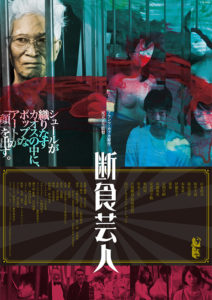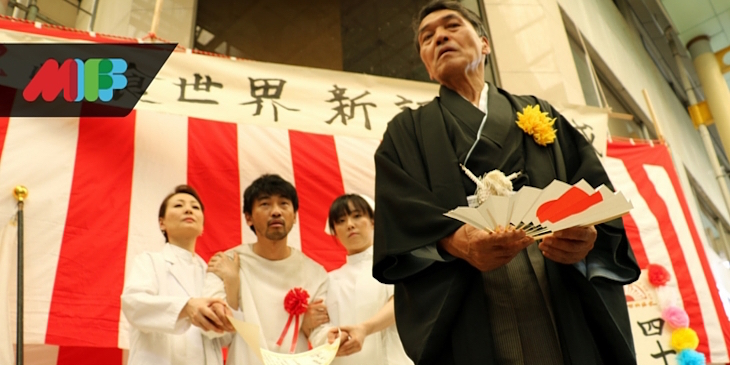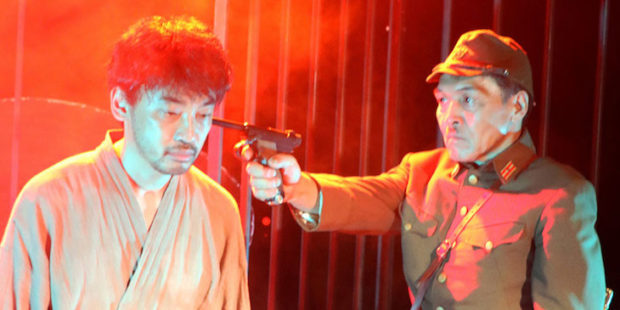 Grotesque, challenging and disturbing, the Japanese spin on Kafka marks the return of a unique voice.
Grotesque, challenging and disturbing, the Japanese spin on Kafka marks the return of a unique voice.
“During these last decades the interest in professional fasting has markedly diminished.” The opening words of Franz Kafka’s short story, A Hunger Artist, are echoed in Masao Adachi’s film, his first after a long hiatus. Where Kafka’s allegorical tale compared the purity of the artist’s intention with the commercial interests that chose to manipulate it, Adachi bluntly wields ARTIST OF FASTING (断食芸人) as a potted summary of modern politics and protest movement.
In an ordinary shopping centre, an unidentified man (Hiroshi Yamamoto) sits down on the street. A young boy is fascinated, takes a photo of him and it goes viral. The man is soon hailed as a “Hunger Artist” by the media, attracting fans, disbelievers, followers and pseudo-worshippers to surround his spot. Two Buddhist monks, for example, wait for him to achieve a kind of enlightenment, while the homeless and gangsters regularly steal the money and food that’s left for him.
ARTIST OF FASTING is not an easy film to watch, filled with both extreme absurdist humour and equally extreme sex and violence. There are at least two ways of viewing ARTIST OF FASTING, which is wholly in keeping with ambiguity of ideals that Adachi explores in the narrative. You could take the whole thing as satire, a systematic skewering of various societal tropes as each visitor to the “Artist” comes burdened with their own insecurities, agendas or greed. The Artist, just as he is in Kafka’s short story, is treated as if he is in a circus, complete with an official cage and armed guard.
Or you could take it prima facie, as an artistic statement unto itself with as much meaning attached to it as the “Artist” gives his fasting. With either case it becomes a problematic film, troubling to say the least. This is because Adachi repeatedly uses rape as a narrative device, and this repugnant use of triggers is there to evoke a reaction from the audience with scant regard for the consequences. “I use rape in my work as a symbol of the miscommunication of the contemporary human condition,” he has suggested elsewhere. Yet Adachi goes out of his way to introduce it into the story, creating a whole sub-plot around a young woman (Juri Ihata) who feels calmed by the quiet that the Artist projects. She is forcibly and physically removed from the scene, so that the viewer has no choice but to endure the sequence as an indulgence of the filmmaker. It’s not the only non sequitur aside in the film, which is filled with artistic fantasies, but it is the most disturbing.
Here Adachi does little to escape his reputation of being associated with pinku eiga (“pink cinema”), the soft-porn exploitation films of the 1970s. The Artist is surrounded by BDSM madams, as large-breasted dominatrixes make frequent visits to the cage. It’s a awkward clash of influences, as the film drifts further from the simplicity of its original statement, one where montages of the 2011 tsunami and historical photos of other Japanese performance artists and indigenous peoples are flashed on the screen, almost as if their presence alone can politically elevate the madness on display.
It would be unfair to treat ARTIST OF FASTING as a wholly isolated entity. It is a statement piece, and like all provocative art it is meant to challenge. When the Artist is asked in Kafka’s original short why he persisted with the fasting, he simply replied “because I couldn’t find the food I liked. If I had found it, believe me, I should have made no fuss and stuffed myself like you or anyone else.” Audiences of Adachi’s film will undoubtedly feel the same way: if they find their own politics represented, there will be little cause for complaint. For the rest of us, challenging is the operative word here, and for a film that includes both necrophilia and scatalogical references, the unflinching grotesquerie is just too much.
ARTIST OF FASTING is playing at the Melbourne International Film Festival 28 July – 14 August 2016. It is also released in Australian cinemas on 1 September 2016 from Madman Entertainment.
2016 | Japan | DIR: Masao Adachi | WRITER: Masao Adachi | CAST: Hiroshi Yamamoto, Taizo Sakurai, Show Ryuzanji | RUNNING TIME: 104 minutes | DISTRIBUTOR: MIFF 2016 (AUS) | RATING: ★★





